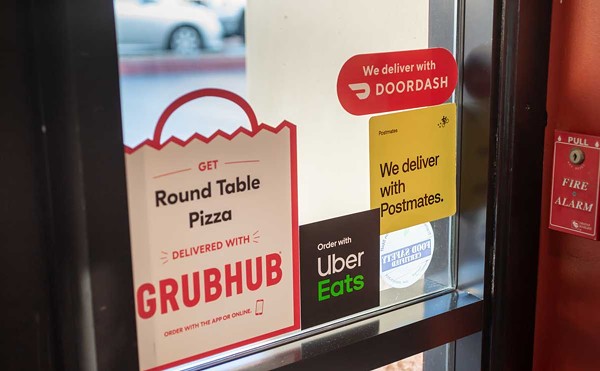THEM'S THE RULES — Strictly enforced rules against hot plates in residence halls often leave dorm-dwellers at the mercy of their cafeterias and microwaves. If you're off to campus housing, be sure to check their lists of prohibited items. They can get a little intense, forbidding everything from the obvious (firearms, space heaters) to the ingenious (electric blankets, mercury thermometers, waterbeds, sun lamps and even "fog machines").
WE DON'T NEED NO FIRE — Do sensible fire safety rules consign residents to a diet of processed, nukable food? Not necessarily. Just because you only have a microwave doesn't mean you have to live on boxes of fatty, salty meat dumplings. Microwaves can make some great mashed potatoes, and can crisp up fuss-free potato skins, if you're willing to put the effort in. And a host of cold recipes — such as gazpacho, salads, guac or even trail mix — can we whipped up without heat at all, making quick, healthful snacks.
GET IT FRESH — If, somehow, you can use an actual kitchen to prepare food, things get fresher and cheaper. Instead of getting overprocessed fare like fish sticks and French bread pizzas, you can get right to the source, using fresh produce. Some of our biggest schools are located in areas with farmers' markets where you can buy food at the peak of freshness. Ypsilanti and Ann Arbor have three between them, and Detroit has not just Eastern Market but the Wayne State's weekly green market. Not only is that sort of food better for you, it requires the least preparation. Even a half-ripe tomato sliced and lightly salted can be a delicacy.
TOOL TIME — To outfit your kitchen, all you really need is a peeler, a can opener, a wooden spoon, a grater, a cutting board, a few sharp knives, some sort of strainer and some tongs. You won't need inside-the-shell egg scramblers, lettuce spinners or even a garlic press if you're willing to hone your chops. Use your knives.
CHEAP STUFF — It's not a mistake that such Amerindian staples as potatoes, corn and squash are cheap wonders in the kitchen. Until medieval times, these vegetables were unknown in the Old World. When early explorers brought them from the New World, the shit-ton of nutrition in them helped kick off a population explosion in Europe. Potatoes in particular are a wonderfully versatile vegetable. If you want to exploit its starchy goodness, take a gander at the potato volume in the Williams-Sonoma Collection for an idea of its versatility.
USE YOUR NOODLE — When it comes to supermarket shopping, ramen noodles often give the most bang for your buck — sometimes at five packs a dollar. They're not just cheap, they're consistently edible, and can even take a nuking in a bowl of hot water. They make the cost of a strainer or colander worth it. Ditch the "spice packet" (often just powdered salt and fat, anyway) and dress your noodles up with finer things. What's your ramen-modification plan? Ramen-tuna casserole? Ramen drizzled with condensed cream of mushroom soup? Ramen yakisoba? Ramen makes a versatile foundation, for the beginner cook and gourmet alike.
WHAT'S POPPIN' — If you've been subsisting on those microwavable pouches, you've been missing out. It's much cheaper to pop up by the pound, and digging into a buttered and (lightly, please!) salted tub of popcorn goes down real good with the Netflixes. Once you've indulged, you'll happily sacrifice one of your pots to the Native American snack, or, better yet, invest in a popper with a spinning rack to keep those kernels from burning. You'll never go back to cheesy-poofs.
ASIA'S CEREAL — There's more than a grain of truth to the phrase "billions can't be wrong." If about half the world's population practically lives on the stuff, it follows that our college students can too. Even the priciest rices — sticky Japanese rice, supple basmati rice — are affordable in large quantities. But you'll have to get it in bulk, and the best can be had at ethnic markets. You might just break up with old Uncle Ben and hook up with a rice cooker.
BEAN BAGS — Dehydrated beans are a great value. Just soak them in a bowl in the fridge and they're good to go, some of the cheapest protein around. So why don't more people do it? Because it sucks. You have to plan a day ahead, soaking them for hours and hours. But somebody recently pointed out to us that the soaked beans can then be frozen in smaller servings, ensuring an easy supply of tender, soaked beans. We cannot argue with this strategy — at least for anybody single, or dating an eproctophiliac.
ONE BIG POT — Let's face it, you're busy! Between your gigs and your classes, you're too worn out to cook every day. Well, focus on a strategy of cooking one large dish, usually in an oversized pot, and keeping it covered all week in the fridge. All-week chilis, lentil dishes, soups and stews can be reheated and cooked down bit by bit, with the various juices swapping for better flavor. And, if it starts to get dull around finals week, splash on the hot sauce for better leftovers.
GROW YOUR OWN — Even if you don't have a lot of space, you can still grow some herbs in a southern window. Basil, parsley or cilantro can help spice up your hashes, and help you dodge the industrially dried and irradiated spices you'll find in the supermarket. Add water and harvest.
SMART SHOPPING — Forget every brand name or ad campaign you ever heard of. Instead of shuffling through the supermarket, shopping at eye level, look down near the floor for the cheaper knock-offs. Or, better, yet, get out of the supermarket altogether, patronizing farmers' markets, ethnic stores or CSAs.
FLESH FOR SALE — Though a vegetarian diet may promote better health, the good news for meat eaters is that meat is still subsidized and cheap, protein for the taking. Novice meat-shoppers beware: The best cuts aren't solid-red; they're marbled with fat in intricate veins, but don't be fooled by chuck. Steak-lovers can rejoice that, in America, we can enjoy the finest steaks that $5 can buy, brushed with salt and pepper and grilled four to six minutes on a side. Comb classifieds and Craigslist for a cheap hibachi.
STINKROOT — Only sissies complain about onion- or garlic-breath. These sturdy bulbs are the greatest, most versatile vegetables for the frugal cook. Go for the small, tight bulbs; the large ones are only full of water. Simmering and sautéing heightens the flavor, and only small amounts of sautéed garlic or caramelized onions can alter a dish for the better.
NOW YOU'RE COOKING — Building your food preparation skills is easier and more rewarding than you might think. Kick your skills up enough, and you'll earn bragging rights among your friends.
Making it
A cookbook just for students
Believe it or not, this year saw the publication of a cookbook that's tailored to students off to college. It's called Freshman in the Kitchen (Huron River Press, $17.95), by Eli and Max Sussman, two brothers from Huntington Woods. They both graduated in 2007, Eli from Michigan State University, Max from the University of Michigan. By their senior years, they were both working in restaurants, watching classmates eat out night after night. Thinking of how these students could save a lot of money if they had a drool-proof guide to cooking, they dedicated themselves to the project.
Their creation is neither stuffy nor intimidating. It's actually a pretty fun guide that starts from nothing, teaching such simple things as what tools you'll need and how to boil pasta. Though most recipes don't take more than 20 minutes of work, the book eventually arrives at complex dishes that could impress a date. But is it realistic to ask students to make sushi, yakisoba or crêpes?
Eli says, "I do think that it is realistic. I think there is some pushback against the idea of cooking because some people think it's hard. But it isn't if you start small and build your way up. Our goal is convince those people that there are better options out there that they can totally learn how to do it if they put in a small amount of effort. You can make good food for yourself. You don't have to rely on delivery and fast food."
Michael Jackman is a writer and copy editor for Metro Times. Send comments to [email protected]




